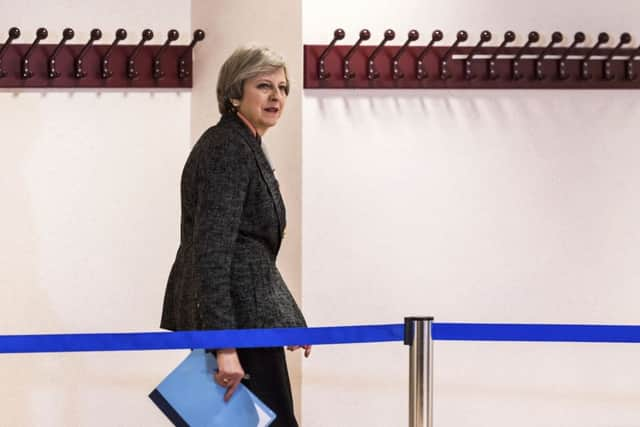Andrew Vine: One-party state is no laughing matter, Mrs May


The evidence is there in the air of smugness, even hubris, about Theresa May and her government that sees them openly laugh in the faces of the Opposition across the dispatch box.
Closer to home, it’s there in the air of quiet despair, even fatalism, of Labour members in Yorkshire constituencies who look at their party’s leadership and wonder how it could possibly be so out of touch.
Advertisement
Hide AdAdvertisement
Hide AdThe smugness and despair are hallmarks of such a total dominance of politics – at least in England – by the Conservatives that there is no prospect of any other party winning power for the foreseeable future.
There is no chance of Labour, in its current feebleness and disconnection from moderate voters, winning a general election. Nor is it even functioning as an effective Opposition in holding the Government to account as Brexit’s Article 50 is triggered.
No wonder that Mrs May can throw back her head in the Commons and laugh uproariously and mockingly at Jeremy Corbyn.
Not even the outcry within its own ranks over hiking National Insurance for the self-employed has seriously dented the Government’s confidence that Labour poses no threat.
Advertisement
Hide AdAdvertisement
Hide AdSo we’re living in a one-party state, and whilst that is manna for Tory members, it’s bad for democracy.
Only once before in my lifetime has a Conservative government had such a free ride without being seriously troubled by Labour. That was 35 years ago, in the aftermath of Britain winning the Falklands War, when the Tories under Margaret Thatcher were virtually impregnable to attack from Michael Foot’s chaotic Labour.
Then, Labour went into the 1983 election on a manifesto memorably described by the late Sir Gerald Kaufman as “the longest suicide note in history”. Whenever the next election comes, the party is in serious danger of writing yet another farewell to millions of voters.
Such total dominance was not good for debate and healthy politics in the 1980s, and it’s no better now.
Advertisement
Hide AdAdvertisement
Hide AdIt fosters complacency and high-handedness, encourages dogma ahead of good decision-making, and leads to the imperious swatting away of legitimate concerns.
Dominance of a political landscape is no more beneficial in the long run for party leaders than it is for the country. Tony Blair was ruined by it, his overweening sense of being able to do no wrong leading him to take Britain into the disastrous entanglement in Iraq.
Mrs May must hardly be able to believe her luck. As she basks in approval ratings that would have been envied by either Mrs Thatcher or Mr Blair in their pomp, where does any challenge to her authority come from?
Not from Labour with Mr Corbyn in charge. The loss of the hitherto safe Copeland seat after 80 years in last month’s by-election showed that the Conservatives can attract Labour voters naturally drawn to the centre ground of politics.
Advertisement
Hide AdAdvertisement
Hide AdParty members I know in constituencies in West and South Yorkshire who believe Mr Corbyn is unelectable are sunk in gloom. They see no prospect of returning Labour to winning ways as long as he remains, and fear that only catastrophe for the party at the polls will remove him.
And if heartland seats are lost, as they were in Scotland, they may never be won back.
There is no appetite for yet another leadership contest, which Mr Corbyn would probably win for a third time. As one member said to me: “Lots of us just hope that he’s going to get sick of the hassle and decide to go.”
Those forlorn hopes are not the sentiments of a party in a fit state to act as a vigorous Opposition ready to present its credentials as a Government in waiting.
Advertisement
Hide AdAdvertisement
Hide AdNor is Ukip, so feared by Mrs May’s predecessor, any threat. Its failure to make much of an impression in the Stoke by-election leaves it exposed as a disorganised rabble riven by infighting whose moment in the sun has passed.
The time may be ripe for a Liberal Democrat resurgence, but it is a long climb back from the rout they suffered in the 2015 election.
At least in Scotland and Wales voters have the SNP and Plaid Cymru to turn to, but in England the present – and likely the next election – belongs to the Conservatives, even with such a slender majority in Parliament.
That degree of dominance does not make for a healthy democracy, any more than it would if the position was reversed and Labour were unchallenged.
Advertisement
Hide AdAdvertisement
Hide AdGood governance thrives on debate and challenge, consensus and compromise. Without them, recent history tells us that one-party dominance results in a legacy of mistakes that might yet wipe the smile off Mrs May’s face.